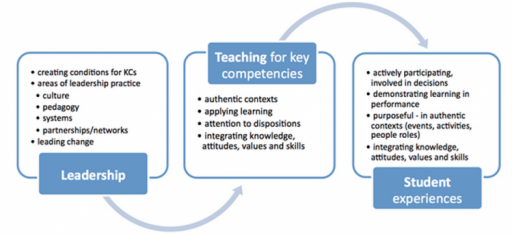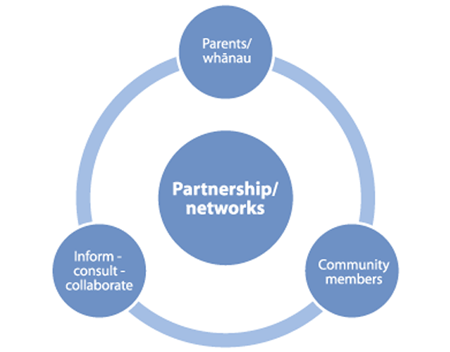Leadership and the key competencies
Learners are most likely to develop and strengthen their capabilities for living and learning when they learn with teachers in a school whose leadership creates conditions that stimulate key competencies.
The key competencies element of The New Zealand Curriculum brings with it exciting possibilities for making students’ experience of learning more relevant, engaging, meaningful, and useful. Key competencies-rich programmes will enable students to be confident, connected, actively involved learners in the present and in the future. They will encourage lifelong learners who are equipped to participate in rapidly changing local, national, and global communities.
Giving effect to key competencies in ways that address their complexity will entail significant challenge and change. Tackling those challenges and compelling change to support key competencies is a vital role for school leadership. Effective leaders create the conditions required for key competencies in teaching and learning. They need to ensure that the culture, pedagogy, systems, partnerships, and networks in their school support key competency development. Leaders also need knowledge and skills in leading change since, for many, key competencies require, and make possible, a significant change in practice.
View a text version of this diagram.
Partnerships and networks
Partnerships/networks: Do school leaders strengthen partnerships and networks in ways that support key competencies?
Key competencies are not only about what students learn in a classroom. They are about students applying learning in a wide range of authentic contexts – at school, at home, and in the wider community. It is important for school leadership to establish systems and a culture in which teachers, students, parents, and caregivers recognise how learning occurs across all of those contexts, and create educationally powerful connections with family, whānau, and communities.
Teachers need to be able to be responsive to students’ capabilities as they occur at school, at home, and beyond. Effective principals will ensure the school community develops in a way that connections can be made between these contexts.
Parents and whānau also need to be able to support their child’s learning. Effective leadership will build school-family connections that focus on teaching and learning. They will ensure that the most powerful connections are developed (those, for instance, that help parents support their children’s learning at home and school or those that incorporate family and community knowledge into curriculum and teaching). A key role for school leadership will be in supporting communities to recognise key competencies as a valued aspect of student learning. Effective leadership will also reduce expectations likely to lead to negative outcomes for learners (requirements for parent involvement that are not supported, for example, homework surveillance/parent help with homework).
Networks with those in the wider community will also help students and teachers as they seek opportunities for students to apply their learning beyond school in authentic ways. Leaders have a key role in fostering those networks by developing relationships with community partners – for instance, across schools and centres, and with community groups.
Do the partnerships with parents and whānau at your school help parents to support their children’s learning?
Do partnerships with parents and whānau enable consideration about students’ competencies across school and home contexts?
Do recent school activities aimed at home-school partnerships emphasise informing parents and caregivers, consulting them, or collaborating with them in their child’s learning?
Published on: 06 May 2014
Return to top


